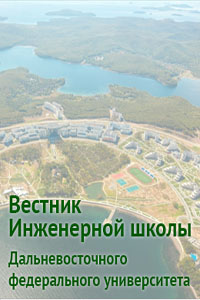Modelling marine motor lubricating oil purification efficiency accounting deposit buildup in and clogging up of filter material pores
DOI:
https://doi.org/10.24866/2227-6858/2024-4/64-74Keywords:
motor oil, oil purification, filtering, filter material, clogging up of filter material poresAbstract
The efficiency of systems fluid (lubricating oil) purification from foreign solids accounting deposit buildup in and clogging up of the pores has been identified. The modelling goal has been to generate such conditions and mechanisms for insoluble contaminant (IC) screening that would make full use of the capabilities offered by the studied methods of heterogeneous systems separation accompanied by the deposit buildup in filtering material pores and surface. The action of external forces causing contaminant particle trajectories to deviate from dispersion medium flowlines and their filtering have been combined and represented by a complex index of εd screening coordinate. The novelty of the filtering process study is in establishing such distribution of contaminants by screening zones and mechanisms where the most profitable compromise between the filtering elements’ (FE) screening fineness (completeness) and retention capacity (service life) could be reached. Purification kinetics and changes in irregular porous structure filtering diaphragm pore size when filtering contaminants of wide fractional compositions have been shown. The filtering process dependencies obtained can be applied to assessing the efficiency of IC screening conducted by marine motor lubricating filtering installations employing nonwoven fabric filtering elements (diaphragms).
References
Kicha G.P., Perminov B.N., Nadezkin A.V. Resource-saving oil use in marine diesel engines. Vladivostok, Publishing House of Maritime State University named after adm. G.I. Nevelskoy, 2011. 372 p. (In Russ.).
Kicha G.P., Semeniuk L.A., Tarasov M.I., Nadezkin A.V. Operational efficiency of full-flow fine cleaning of engine oil in marine auxiliary diesels. Scientific and technical collection of the Russian Maritime Register of Shipping, 2020, no. 58/59, pp. 71–80. (In Russ.).
Perminov B.N. Scientific and technical bases of effective oil use in marine tank diesels. Vladivostok, Publishing House of Maritime State University named after adm. G.I. Nevelskoy, 2005. 378 p. (In Russ.).
Kicha G.P., Tarashchan N.N., Nadezkin A.V. Improving the efficiency of fine cleaning of engine oil in marine tank diesels by combined filtration. Vladivostok, Publishing House of Maritime State University named after adm. G.I. Nevelskoy, 2015. 175 p. (In Russ.).
Kicha G.P., Semeniuk L.A., Tarasov M.I. Stochastic cellular model of engine oil purification from mechanical impurities by volumetric filtration. Marine intelligent technologies, 2020, no. 1(47). vol. 2, pp. 105–112. (In Russ.).
Dunn A.R. Selection of wire cloth for filtration and separation. Filtration and Separation, 1980, vol. 17, no. 10, pp. 437–451.
Collins R.E. Flow of fluids through porous materials. New York, Reinhold Publ. Corp., 1961. 263 p.
Tichy J.A. A model of lubrication filtration. Trans. ASME, Journal of Lubrication Technology, 1981, vol. 103, no. 1, pp. 81–89.
Loitsianskii L.G. Mechanics of liquids and gases. Moscow, Higher education, 1982. 685 p. (In Russ.).
Kicha G.P., Glushkov S.V., Nadezkin A.V. A comprehensive system solution to the problem of resource-saving use in marine diesel engines. Marine intelligent technologies, 2016, no. 3(33), vol. 1, pp. 118–125. (In Russ.).
Vorobjev B.N., Nadezkin A.V., Kicha G.P. Stochastic modeling separation of complex heterogeneous systems of ship devices based on representations and apparatus of random Markov processes. Marine intelligent technologies, 2017, no. 3(37), vol. 2, pp. 112–120. (In Russ.).
Zhuzhikov V.A. Filtering. Theory and practice of suspension separation. Moscow, Chemistry, 1980. 400 p. (In Russ.).
Downloads
Published
Issue
Section
License
Copyright (c) 2024 Far Eastern Federal University: School of Engineering Bulletin

This work is licensed under a Creative Commons Attribution 4.0 International License.

